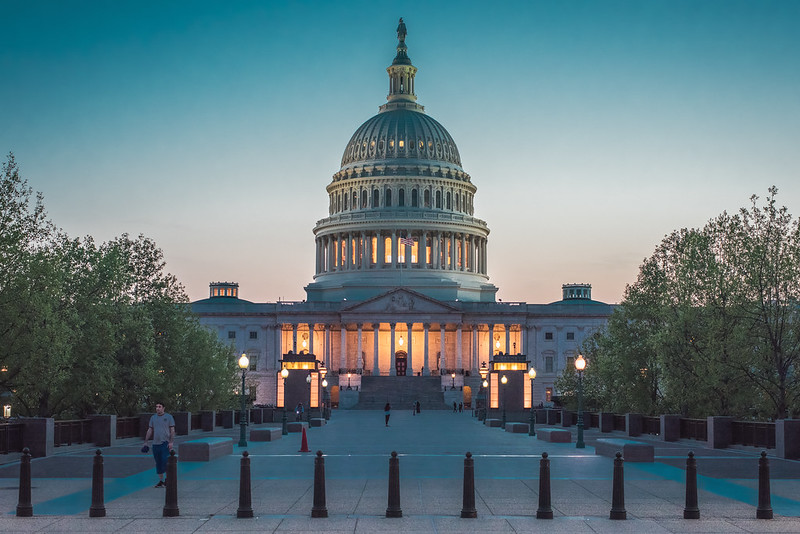The Specter of FISA Reform Haunts Capitol Hill
What on earth is going on with FISA reform in Congress?

A ghost haunts the hallowed halls of Capitol Hill. Members catch glimpses of it occasionally—behind a majestic mahogany desk, or floating mystically near the Statue of Freedom. But just when House Speaker Nancy Pelosi, Majority Leader Mitch McConnell and Attorney General William Barr think they’ve got it trapped, the elusive jinn disappears in a puff of President Trump’s tweets.
The apparition I speak of is, of course, FISA reform.
On May 28, House Democratic leadership canceled a planned vote on the Senate-amended version of H.R. 6172, a bill reauthorizing certain intelligence collection authorities and addressing Foreign Intelligence Surveillance Act (FISA) reform and related issues. The move marked another ignominious step in the months-long effort to reauthorize three intelligence collection authorities—the lone-wolf FISA provision, the roving wiretap provision and the business records provision—and enact civil-liberties-oriented protections to the FISA process. Just a few days before Pelosi’s announcement, it had looked like the bill was on a glide path to passage. But by the morning of May 28, it was clear it did not have the votes in the House.
I write for the second time in as many months: How did we get here, and what happens next?
It’s worth reviewing the tapes. H.R. 6172 passed the House on March 11 on a bipartisan 278-136 vote: Specifically, 152 House Democrats voted in favor, and 75 opposed; 126 House Republicans voted in favor, and 60 opposed. The same day, Barr’s Department of Justice issued a Statement of Administration Policy in support of the House-passed bill. McConnell set a vote on the bill in the Senate.
But it was merely a ghostly apparition. Tweets in opposition to the bill from Sens. Mike Lee and Rand Paul led to a threat of a filibuster—which in mid-March would have eaten up time on the Senate floor needed to consider legislation passed by the House to address the coronavirus pandemic. A March 12 tweet from Trump threatening to veto the bill killed any hope of passage in the Senate before senators headed home on March 26 amid fears of the spreading coronavirus and after passing a $2 trillion coronavirus relief bill.
McConnell worked out a deal with Lee and Paul for the Senate to consider a package of amendments when the body returned to the capital. The bargain? The majority leader agreed to placate the dissenting senators with votes on their amendments in exchange for their agreeing to sign on to a bill in the Senate, passed by unanimous consent, temporarily extending the authorities in question. The House never acted on that bill.
On March 31, the inspector general of the Department of Justice released a disturbing interim report of systemic abuses in the FISA process, following up on his lengthy report last year on the FBI’s handling of the “Crossfire Hurricane” investigation.
Fast-forward to mid-May. The Senate did indeed vote on three of five proposed amendments to H.R. 6172. Two failed. Rand Paul’s amendment essentially gutting the FISA process as applied to U.S. persons failed by a wide margin. Another amendment, offered by Democratic Sen. Ron Wyden and Republican Sen. Steve Daines, would have prohibited Section 215 of the USA Patriot Act from being used for warrantless collection of Americans’ internet website browsing and internet search history information. It just barely failed on a 59-37 vote in the Senate (the threshold for passage was 60), and some insisted that but for the physical absence of Democratic Senator Patty Murray, the amendment would have passed.
One amendment did pass the Senate. Republican Sen. Mike Lee and Democratic Sen. Patrick Leahy offered some fairly modest text enhancing the role of the FISA Court’s amicus curiae and codifying the requirement to include exculpatory evidence in FISA applications. The amendment passed 77-19. The revised bill then passed the Senate on May 14 on a healthy 80-16 vote. And for a few days, the Senate-passed bill seemed like it might pass the House easily and land on President Trump’s desk.
But it was not to be. On May 20, Democratic Rep. Zoe Lofgren and Republican Rep. Warren Davidson urged House leaders to allow a vote on an amendment, styled as a companion to the Wyden-Daines amendment that had just barely failed in the Senate. On May 26, Lofgren announced that an agreed-upon text, supported by House Intelligence Committee Chair Adam Schiff, would prohibit the collection of Americans’ internet search history and web browsing data without a warrant. But the amendment, which might have shored up additional Democratic support for the bill, was scrapped after Sen. Ron Wyden withdrew his support for it on the grounds that it was too narrow in scope. At that point, it looked like the biggest hurdle would be Democratic backing of the bill.
The real death knell, however, came on May 26, when the president posted this tweet:
I hope all Republican House Members vote NO on FISA until such time as our Country is able to determine how and why the greatest political, criminal, and subversive scandal in USA history took place!
— Donald J. Trump (@realDonaldTrump) May 26, 2020
Thereafter, Republican leadership in the House swiftly whipped their members to vote against the bill—that is, a bill previously passed with broad bipartisan support and the strong support of Attorney General Barr. Asked about the change in position, House Minority Leader Kevin McCarthy had this to say:
In moving forward today, it won't be signed into law. The president has questions, the attorney general has questions …. Since the time we had passed the bill in the House, there has been more information coming forward with the FISA court being used in processes it shouldn't have been.
House Minority Whip Steve Scalise was clearer: “The FISA process was abused, and those people that abused it haven’t been held accountable.”
The president rewarded Republicans for their loyalty with this tweet:
Thank you to our GREAT Republican Congressmen & Congresswomen on your incredibly important blockage last night of a FISA Bill that would just perpetuate the abuse that produced the Greatest Political Crime In the History of the U.S., the Russian Witch-Hunt. Fantastic Job!
— Donald J. Trump (@realDonaldTrump) May 28, 2020
As my colleague Benjamin Wittes has noted, the president has treated FISA reform as a favorite Twitter plaything for some time, dating all the way back to January 2018, and again more recently on March 12, when a tweet scuttled a planned vote in the Senate on the House-passed compromise bill. That tweet certainly embarrassed Barr, who had just issued a statement in support of the House-passed bill.
It seems Barr learned his lesson, and this time around he got on the same page as the president. The Department of Justice formally announced its opposition to the bill on May 26. As Jake Laperruque noted on May 29, the department’s explanation for its change of views of the bill does not pass the smell test from a policy perspective and distorts the FISA reforms in the bill. What to make of the Justice Department’s about-face? The fig leaf belies that Barr now realizes the president will almost certainly never support a reauthorization of FISA authorities.
So how does this ghost story end? Late in the day on May 26, Pelosi announced that she would seek to negotiate with Senate Republicans to resolve differences and find a path forward. Most House Democrats, along with some Republicans, voted to convene a conference committee to do that. It’s nice to see an earnest effort at bipartisan compromise, but Pelosi and McConnell have to contend with a harsh reality: Even if the two chambers reached an agreement somehow, the president would almost certainly continue to reject whatever lawmakers offer him.
What does it all mean? For the second time in as many months, I’m left to write that this situation is an indicator of general dysfunction within both Congress and the executive branch. These provisions of FISA were already extended in November 2019, in lieu of substantive discussion about fixes to the law and tacked on to must-pass legislation with the promise of a future debate. Then, months later in March—on the eve of the November extension’s lapse, and in the shadow of a pandemic—the House managed to reach a broad bipartisan compromise on a set of reforms with the buy-in of the attorney general. The president then scuttled that compromise, via tweet. The authorities expired on March 15, and the Senate once again could not find a concrete path forward on reform. And, in May, the Senate for a second time found a path forward only for the president to squash it, via tweet.
Of course, for some members of Congress, on both sides of the aisle, this outcome is welcome. A failure to reauthorize these authorities is a victory, a blow to politically charged surveillance. In this instance, the interests of this congressional minority are aligned with the president, who has not expressed interest in finding a path forward and instead seems to view provocative tweets about surveillance as sound political messaging for his reelection bid.
So we need to ask: What impact will a longer term, or even permanent, lapse of these authorities actually have on law enforcement and intelligence capabilities? To what extent does it really matter if FISA reform remains a specter indefinitely—never quite returning to corporeal form?




-final.png?sfvrsn=b70826ae_3)
